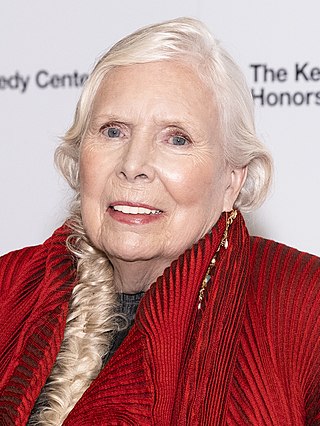
Roberta Joan "Joni" Mitchell is a Canadian-American singer-songwriter, multi-instrumentalist, and painter. As one of the most influential singer-songwriters to emerge from the 1960s folk music circuit, Mitchell became known for her personal lyrics and unconventional compositions which grew to incorporate pop and jazz elements. She has received many accolades, including eleven Grammy Awards and induction into the Rock and Roll Hall of Fame in 1997. Rolling Stone called her "one of the greatest songwriters ever", and AllMusic has stated, "Joni Mitchell may stand as the most important and influential female recording artist of the late 20th century."

Ladies of the Canyon is the third studio album by Canadian singer-songwriter Joni Mitchell, released on Reprise Records in 1970. It peaked at No. 27 on the Billboard 200, and has been certified platinum by the RIAA. The title makes reference to Laurel Canyon, a center of popular music culture in Los Angeles during the 1960s, where Mitchell lived while she was writing the album. Specifically, Mitchell lived and wrote at 8217 Lookout Mountain Avenue, the house which is the subject of Graham Nash's "Our House". The album includes several of Mitchell's most noted songs, such as "Big Yellow Taxi", "Woodstock" and "The Circle Game".
"A Case of You" is a song by Joni Mitchell, from her 1971 album Blue.
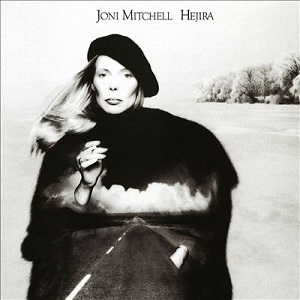
Hejira is the eighth studio album by Canadian singer-songwriter Joni Mitchell, released in 1976 on Asylum Records. Its material was written during a period of frequent travel in late 1975 and early 1976, and reflects Mitchell's experiences on the road during that time. It is characterized by lyrically dense, sprawling songs and musical backing by several jazz-oriented instrumentalists, most prominently fretless bass player Jaco Pastorius, guitarist Larry Carlton, and drummer John Guerin.
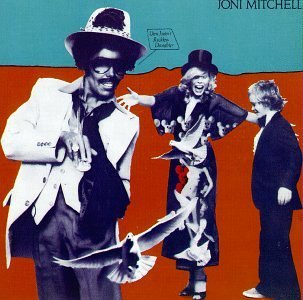
Don Juan's Reckless Daughter is a 1977 double album by Canadian singer-songwriter Joni Mitchell. Her ninth album, it is unusual for its experimental style, expanding even further on the jazz-influenced sound of Mitchell's previous recordings. Mitchell has stated that, close to completing her contract with Asylum Records, she allowed this album to be looser than anything she had done previously.

The Innocence Mission is an American indie folk band formed in Lancaster, Pennsylvania in 1986. The band is composed of Karen Peris, her husband Don Peris, and Mike Bitts. Although all members of the band have contributed to their music, Karen Peris is their main writer.
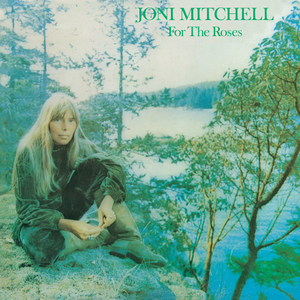
For the Roses is the fifth studio album by Canadian singer-songwriter Joni Mitchell. It was released in November 1972, between her two biggest commercial and critical successes—Blue and Court and Spark. In 2007 it was one of 25 recordings chosen that year by the Library of Congress to be added to the National Recording Registry.

Clouds is the second album by Canadian singer-songwriter Joni Mitchell, released on May 1, 1969, by Reprise Records. After releasing her debut album, Song to a Seagull (1968), to considerable exposure, Mitchell recorded Clouds at A&M Studios in Hollywood. She produced most of the album and painted a self-portrait for its cover artwork. Clouds has subtle, unconventional harmonies and songs about lovers, among other themes.

Shadows and Light is the second live album by Canadian musician Joni Mitchell. It was released in September 1980 through Asylum Records, her last release for the label. It was recorded in September 1979 at the Santa Barbara Bowl in Santa Barbara, California.
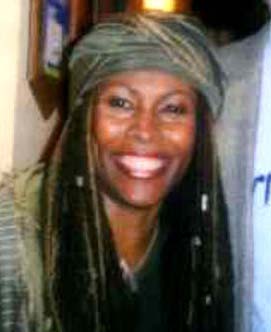
Brenda Russell is an American singer-songwriter, producer, and keyboardist. Russell has a diverse musical range which encompasses R&B, pop, soul, dance, and jazz. She has received five Grammy nominations.

"Help Me" is a love song written, produced, and performed by Joni Mitchell and released on her 1974 album Court and Spark. The song was recorded with jazz band Tom Scott's L.A. Express as the backing band.

Chalk Mark in a Rain Storm is the 13th studio album by Canadian singer-songwriter Joni Mitchell, released on March 23, 1988, by Geffen Records. Her third release on the label, the album features duets with a number of artists such as Peter Gabriel on "My Secret Place", Willie Nelson on "Cool Water", Don Henley on "Snakes and Ladders", and Billy Idol and Tom Petty on the track "Dancin' Clown". Henley also performs backing vocals on "Lakota", and Wendy and Lisa perform backing vocals on "The Tea Leaf Prophecy ".
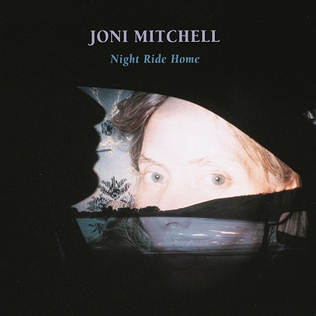
Night Ride Home is the 14th album by Canadian singer-songwriter Joni Mitchell, released in 1991. It was the last of four albums she recorded for Geffen Records.

Turbulent Indigo is the 15th album by Canadian singer-songwriter Joni Mitchell. Released in 1994, it won a Grammy Award for Best Pop Album. John Milward, writing for Rolling Stone, wrote that it was Mitchell's "best album since the mid-'70s".
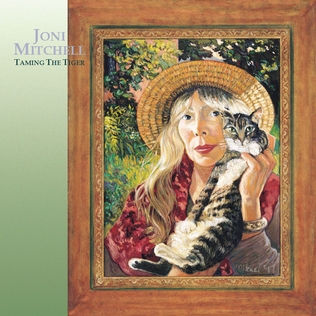
Taming the Tiger is the sixteenth studio album by the Canadian musician Joni Mitchell. Released on September 29, 1998, through Reprise Records, it is the follow-up to the successful Turbulent Indigo (1994). The album was, at the time, widely believed to be her last of completely original material; this would be disproved with the release of Shine in 2007.
"Both Sides, Now" is a song by Canadian singer-songwriter Joni Mitchell. One of the first recordings is by Judy Collins, whose version appeared on the US singles chart during the fall of 1968. The next year it was included on Mitchell's album Clouds, and became one of her best-known songs. It has since been recorded by dozens of artists, including Dion in 1968, Clannad with Paul Young in 1991, and Mitchell herself, who re-recorded the song with an orchestral arrangement on her 2000 album Both Sides Now.

The Circle Game is the 1968 album from folk rock musician Tom Rush. He covers three songs from fellow singer-songwriter Joni Mitchell, as well as songs by Jackson Browne and James Taylor. Rush himself wrote "Rockport Sunday" and his classic, often-covered tune "No Regrets" which has become a folk standard and has been covered by several dozen artists, including Emmylou Harris, The Walker Brothers, Olivia Newton-John, indie-pop group Luna, and Curtis Stigers. In addition to his original rendition here, Rush himself later made a radically different version for Columbia Records featuring a screaming electric guitar solo.

Larry Klein is an American musician, songwriter, and record producer. He is based in Los Angeles.

Misses is a 1996 compilation album by Canadian singer-songwriter Joni Mitchell. The selections, chosen by Mitchell herself, concentrate on her lesser known, more experimental work, including jazz influenced recordings from the late 1970s and electronic music from the 1980s. Mitchell also designed the album cover, which features her bending down in front of the camera. The album is a companion to Hits, issued on the same day. Mitchell agreed to a request from her record company to release a greatest hits album on the condition that she also be allowed to release Misses. There were also plans to release a Misses 2 but were rejected by the label when suggested by Mitchell.
















